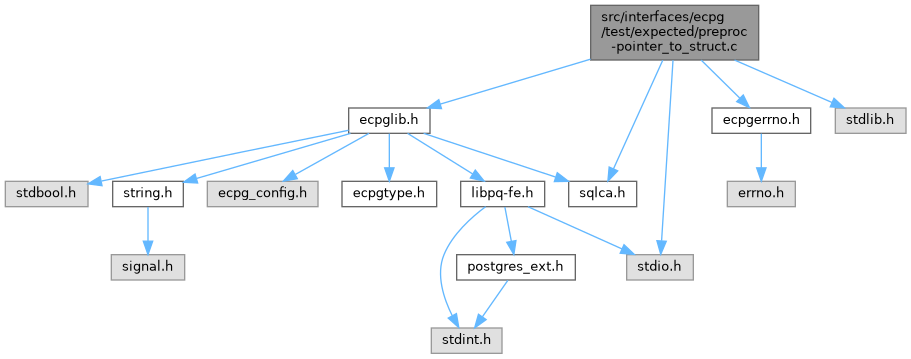Loading...
Searching...
No Matches
preproc-pointer_to_struct.c File Reference
#include <ecpglib.h>#include <ecpgerrno.h>#include <sqlca.h>#include <stdio.h>#include <stdlib.h>
Include dependency graph for preproc-pointer_to_struct.c:

Go to the source code of this file.
Data Structures | |
| struct | customer |
| struct | customer::varchar_1 |
| union | ind |
| struct | company |
Macros | |
| #define | ECPGdebug(X, Y) ECPGdebug((X)+100,(Y)) |
Typedefs | |
| typedef struct ind | cust_ind |
Functions | |
| int | main () |
Macro Definition Documentation
◆ ECPGdebug
Definition at line 7 of file preproc-pointer_to_struct.c.
Typedef Documentation
◆ cust_ind
Function Documentation
◆ main()
Definition at line 61 of file preproc-pointer_to_struct.c.
62{
63 /* exec sql begin declare section */
64
65
66
67
68
69
70 typedef struct {
71#line 37 "pointer_to_struct.pgc"
73
74#line 38 "pointer_to_struct.pgc"
75 int phone ;
76 } customer2 ;
77
78#line 39 "pointer_to_struct.pgc"
79
80
81
82
83
84
85
86
87
88
89
90
91
92
93
94
95
96
97
98
99#line 33 "pointer_to_struct.pgc"
101
102#line 34 "pointer_to_struct.pgc"
104
105#line 40 "pointer_to_struct.pgc"
107
108#line 46 "pointer_to_struct.pgc"
110#line 44 "pointer_to_struct.pgc"
112
113#line 45 "pointer_to_struct.pgc"
114 int phone ;
116
117#line 52 "pointer_to_struct.pgc"
119#line 50 "pointer_to_struct.pgc"
121
122#line 51 "pointer_to_struct.pgc"
123 int phone ;
125
126#line 54 "pointer_to_struct.pgc"
128
129#line 56 "pointer_to_struct.pgc"
130 int r ;
131
132#line 57 "pointer_to_struct.pgc"
134/* exec sql end declare section */
135#line 58 "pointer_to_struct.pgc"
136
137
139
141
143#line 64 "pointer_to_struct.pgc"
144
146#line 64 "pointer_to_struct.pgc"
147
149#line 64 "pointer_to_struct.pgc"
150
151
152 { ECPGdo(__LINE__, 0, 1, NULL, 0, ECPGst_normal, "create table customers ( c varchar ( 50 ) , p int )", ECPGt_EOIT, ECPGt_EORT);
153#line 66 "pointer_to_struct.pgc"
154
156#line 66 "pointer_to_struct.pgc"
157
159#line 66 "pointer_to_struct.pgc"
160
161
162 /* First we'll insert some data using C variable references */
165 custs1[0].phone = 12345;
166
169 acme.customers[1].phone = 67890;
170
176#line 78 "pointer_to_struct.pgc"
177
179#line 78 "pointer_to_struct.pgc"
180
182#line 78 "pointer_to_struct.pgc"
183
185#line 78 "pointer_to_struct.pgc"
186
192#line 80 "pointer_to_struct.pgc"
193
195#line 80 "pointer_to_struct.pgc"
196
198#line 80 "pointer_to_struct.pgc"
199
201#line 80 "pointer_to_struct.pgc"
202
203
204 /* Clear the array, to be sure reading back into it actually gets data */
206
207 /* Now read back the data */
213#line 86 "pointer_to_struct.pgc"
214
216#line 86 "pointer_to_struct.pgc"
217
219#line 86 "pointer_to_struct.pgc"
220
222#line 86 "pointer_to_struct.pgc"
223
225 for (r = 0; r < 2; r++)
226 {
229 }
230
236#line 94 "pointer_to_struct.pgc"
237
239#line 94 "pointer_to_struct.pgc"
240
242#line 94 "pointer_to_struct.pgc"
243
245#line 94 "pointer_to_struct.pgc"
246
248 for (r = 0; r < 2; r++)
249 {
252 }
253
259#line 102 "pointer_to_struct.pgc"
260
262#line 102 "pointer_to_struct.pgc"
263
265#line 102 "pointer_to_struct.pgc"
266
268#line 102 "pointer_to_struct.pgc"
269
271 for (r = 0; r < 2; r++)
272 {
275 }
276
282#line 110 "pointer_to_struct.pgc"
283
285#line 110 "pointer_to_struct.pgc"
286
288#line 110 "pointer_to_struct.pgc"
289
291#line 110 "pointer_to_struct.pgc"
292
296
300#line 115 "pointer_to_struct.pgc"
301
303#line 115 "pointer_to_struct.pgc"
304
306#line 115 "pointer_to_struct.pgc"
307
309#line 115 "pointer_to_struct.pgc"
310
312 for (r = 0; r < 2; r++)
313 {
315 }
316
318#line 122 "pointer_to_struct.pgc"
319
321#line 122 "pointer_to_struct.pgc"
322
324#line 122 "pointer_to_struct.pgc"
325
326
327 /* All the memory will anyway be freed at the end */
328 return 0;
329}
bool ECPGconnect(int lineno, int c, const char *name, const char *user, const char *passwd, const char *connection_name, int autocommit)
Definition connect.c:260
bool ECPGdo(const int lineno, const int compat, const int force_indicator, const char *connection_name, const bool questionmarks, const int st, const char *query,...)
Definition execute.c:2291
Definition preproc-array_of_struct.c:53
Definition preproc-array_of_struct.c:33
Definition preproc-array_of_struct.c:43
References ECPG_NOT_FOUND, ECPGconnect(), ECPGdebug, ECPGdisconnect(), ECPGdo(), ECPGst_normal, ECPGt_char, ECPGt_EOIT, ECPGt_EORT, ECPGt_int, ECPGt_NO_INDICATOR, ECPGt_short, ECPGt_varchar, fb(), len, malloc, name, printf, sqlca, and sqlprint().